BMW 7 Series
 2009 BMW 750Li |
|
| Manufacturer | BMW |
|---|---|
| Production | 1977–present |
| Assembly | Dingolfing, Germany[1] Toluca, Mexico[2] |
| Predecessor | BMW New Six |
| Class | Full-size luxury car |
| Body style(s) | 4-door sedan |
| Layout | FR layout |
The BMW 7 Series is a line of full-size luxury vehicles produced by the German automaker BMW. Introduced in 1977, it is BMW's flagship car and is only available as a sedan.
There have been five generations of the 7 Series:
- BMW E23 (1977–1986)
- BMW E32 (1987–1994)
- BMW E38 (1995–2001)
- BMW E65/E66 (2002–2008)
- BMW F01 (2009–present)
Contents |
E23 (1977–1986)
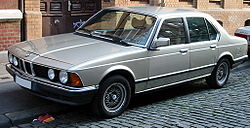 |
|
| Production | 1977–1986 |
|---|---|
| Engine(s) | 3.2 L I6 3.4 L I6 2.5 L I6 2.8 L I6 3.0 L I6 3.3 L I6 3.5 L I6 |
| Transmission(s) | 3-speed automatic 4-speed automatic 4-speed manual 5-speed manual |
Models offered:
| Model | Engine | Power | Torque | Built | ||||||||
|---|---|---|---|---|---|---|---|---|---|---|---|---|
| PS | kW | hp | at rpm | N·m | ft·lbf | at rpm | ||||||
| 725‡ | 2494 cc I-6 | 150 | 110 | 150 | 5800 | 208 | 153 | 4000 | 1977−1979? | |||
| 728 | 2788 cc I-6 | 170 | 130 | 170 | 5800 | 233 | 172 | 4000 | 1977−1979 | |||
| 728i | 2788 cc I-6 | 184 | 135 | 181 | 5800 | 235 | 173 | 4200 | 1979−1986 | |||
| 730 | 2985 cc I-6 | 184 | 135 | 181 | 5800 | 255 | 188 | 3500 | 1977−1979 | |||
| 732i | 3205 cc I-6 | 196 | 144 | 193 | 5500 | 279 | 206 | 4500 | 1979−1986 | |||
| 733i | 3205 cc I-6 | 197 | 145 | 194 | 5500 | 279 | 206 | 4300 | 1977−1979 | |||
| 735i | 3453 cc I-6 | 218 | 160 | 215 | 5200 | 304 | 224 | 4000 | 1979−1982 | |||
| 735i | 3430 cc I-6 | 218 | 160 | 215 | 5200 | 304 | 224 | 4000 | 1982−1986 | |||
| 745i | 3205 cc I-6 | 252 | 185 | 249 | 5200 | 374 | 276 | 2600 | 1980−1982 | |||
| 745i | 3430 cc I-6 | 252 | 185 | 249 | 4900 | 374 | 276 | 2200 | 1983−1986 | |||
| North America and Japan | ||||||||||||
| 733i | 3210 cc I-6 | 179 | 132 | 177 | 5500 | 266 | 196 | 4000 | MY 1978−1979 | |||
| 733i | 3210 cc I-6 | 176 | 130 | 174 | 5200 | 255 | 188 | 4200 | MY 1980−1981 | |||
| 733i | 3210 cc I-6 | 184 | 135 | 181 | 6000 | 264 | 195 | 4000 | MY 1982−1984 | |||
| 735i/L7 | 3430 cc I-6 | 185 | 136 | 182 | 5400 | 290 | 214 | 4000 | MY 1985−1987, L7 1986–1987 |
|||
| South Africa | ||||||||||||
| 745i | 3453 cc I-6 | 286 | 210 | 282 | 6500 | 340 | 250 | 4500 | 198?−198? | |||
| Note: ‡ For government agencies and on special order only[3] | ||||||||||||
E32 (1986–1994)
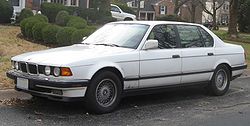 |
|
| Production | 1986–1994 |
|---|---|
| Engine(s) |
3.0 L 188 hp I6 |
| Transmission(s) | 4-speed automatic 5-speed manual 5-speed automatic |
| Wheelbase | 2,832 mm (111.5 in) (Base) 2,946 mm (116.0 in) (Middle & Top End) |
| Length | 4,910 mm (193.3 in) (Base) 5,024 mm (197.8 in) (Middle & Top End) |
| Width | 1,844 mm (72.6 in) |
| Height | 1,412 mm (55.6 in) (Base) 1,400 mm (55.1 in) (Middle & Top End) |
The E32 was introduced in 1986, with the 730i and 735i featuring 3.0 L and 3.5 L straight-6 engines respectively, and a new, 5.0 L, 300 horsepower (220 kW) V12 engine for the 750i. In 1992, 3.0 L and 4.0 L V8 engines were added to the lineup (730i and 740i). All models were also available in a stretched 'L' version, which had 10 cm of extra legroom for the rear passengers. See BMW E32 article for more information.
| Model | Engine Code | Engine Type | Displacement | Power | Torque | 0–100 km/h (s) | Years made |
|---|---|---|---|---|---|---|---|
| 730i | M30 | I6 12V | 2,986 cc (182.2 cu in) | 188 bhp (140 kW; 191 PS) @ 5800 | 260 N·m (190 lb·ft) @ 4000 | 9.3 (man) / 10.6 (aut) | 1986–1994 |
| 735i | M30 | I6 12V | 3,430 cc (209 cu in) | 211 bhp (157 kW; 214 PS) @ 4900 | 305 N·m (225 lb·ft) @ 4000 | 8.3 (man) / 9.1 (aut) | 1986–1992 |
| 730i V8 | M60 | V8 32V | 2,997 cc (182.9 cu in) | 218 bhp (163 kW; 221 PS) @ 5800 | 290 N·m (210 lb·ft) @ 4500 | 8.5 (man) / 9.3 (aut) | 1992–1994 |
| 740i | M60 | V8 32V | 3,982 cc (243.0 cu in) | 286 bhp (213 kW; 290 PS) @ 5800 | 400 N·m (300 lb·ft) @ 4500 | 7.4 (aut) | 1992–1994 |
| 750i | M70 | V12 24V | 4,988 cc (304.4 cu in) | 299 bhp (223 kW; 303 PS) @ 5200 | 450 N·m (330 lb·ft) @ 4100 | 7.4(aut) | 1987–1994 |
U.S figures
| Model | Engine Code | Engine Type | Displacement (cc) | Power | Torque | 0–100 km/h (s) | Years made |
|---|---|---|---|---|---|---|---|
| 735i/L | M30 | I6 12V | 3,430 cc (209 cu in) | 208 bhp (155 kW; 211 PS) @ 4900 | 305 N·m (225 lb·ft) @ 4000 | 8.3 (man) / 9.1 (aut) | 1988–1992 |
| 740i/L | M60 | V8 32V | 3,982 cc (243.0 cu in) | 282 bhp (210 kW; 286 PS) @ 5800 | 400 N·m (300 lb·ft) @ 4500 | 7.4 (aut) | 1993–1994 |
| 750i/L | M70 | V12 24V | 4,988 cc (304.4 cu in) | 296 bhp (221 kW; 300 PS) @ 5200 | 450 N·m (330 lb·ft) @ 4100 | 7.4(aut) | 1988–1994 |
E38 (1994–2001)
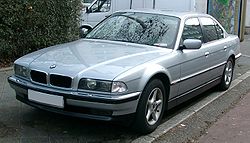 |
|
| Production | 1994–2001 |
|---|---|
| Engine(s) | 4.4 L 282 hp (210 kW) V8 5.4 L 322 hp (240 kW) V12 5.4 L 326 hp (243 kW) V12 |
| Transmission(s) | 5-speed automatic 5-speed manual |
| Wheelbase | 3,071 mm (120.9 in) 2,931 mm (115.4 in) (base only) |
| Length | 5,123 mm (201.7 in) 4,983 mm (196.2 in) (base only) |
| Width | 1,862 mm (73.3 in) |
| Height | 1,425 mm (56.1 in) 1,435 mm (56.5 in) (base only) |
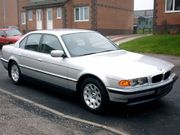
The E38 generation (1994–2001) had a five-speed automatic. The engine variants in Europe were 725tds, 728i, 730i, 730d, 735i, 740i (4.0 and 4.4 L), 740d and 750i (with a 5.4 L V12 322 bhp (240 kW; 326 PS) engine, as was used in the Rolls-Royce Silver Seraph).
In America, the models were sold as the 740i, 740iL and 750iL. The 740i and 740iL shared the same 4.0 L V8 engine in model year 1995, but the next year the V8 grew to 4.4L while stated power stayed at 282 hp (210 kW), though torque grew from 295 to 310 lb·ft (400 to 420 N·m). Then again coinciding with the 1999 facelift, the V8's power again stayed the same but now torque grew further to 324 lb·ft (439 N·m), due to new variable valve timing. The 740iL is essentially a long-wheelbase 740i (the "L" is from the German word for long, "lang"). The considerably rarer 5.4 L V12-powered 750iL was only available as a long-body; there was no E38 750i in the US lineup.
The 750iL was BMW's flagship sedan. It was featured in the 1997 film Tomorrow Never Dies as the car driven by James Bond.[4]
E65/E66 (2002–2008)
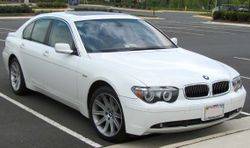 |
|
| Production | 2002–2008 |
|---|---|
| Engine(s) | 4.4 L 325 hp (242 kW) V8 4.8 L 360 hp (270 kW) V8 6.0 L 438 hp (327 kW) V12 |
| Transmission(s) | 5-speed automatic 6-speed automatic |
| Wheelbase | 2,990 mm (117.7 in) (SWB) 3,129 mm (123.2 in) (LWB) |
| Length | 5,029 mm (198.0 in) (2002-05 E65) 5,169 mm (203.5 in) (2002-05 E66) 5,039 mm (198.4 in) (2006-present E65) 5,179 mm (203.9 in) (2006-present E66) |
| Width | 1,902 mm (74.9 in) |
| Height | 1,491 mm (58.7 in) 1,483 mm (58.4 in) (2006-present LWB) 1,476 mm (58.1 in) (Alpina B7) |
The 4th generation was available on four different platforms: the standard-wheelbase E65 (2990 mm, 118 in), the extended-wheelbase E66 (3130 mm, 123 in), the High Security version E67 and the hydrogen powered version E68. It dropped the manual transmission entirely.
The E65/E66/E67/E68 7 Series featured BMW's first of a kind iDrive system, consisting of a video screen in the dashboard and a controller mounted on the center console that is used in a similar way to a computer mouse. Using a system of eight menus, most of the car's climate, audio, navigation, suspension and communication settings are controlled via iDrive. However, the system has been criticized by many automotive writers as being too complex and not intuitive enough.
"Active" Seat continuous passive motion technology was made standard equipment on the 750/760 models and included in the Luxury Seating Package with heated and ventilated seats for driver and front passenger on the 745 models.
The car was available in thirteen variants[5]—of those, 11 were on sale in Europe, with five available in the U.S. since diesel models were not available there.
| Engine | Power | Torque | 0–100 km/h* | Top speed | |
|---|---|---|---|---|---|
| 730i | 3.0 L petrol (gasoline) I6 | 170 kW (231 PS; 228 hp) | 300 N·m (220 lb·ft) | 8.1 s | 237 km/h (147 mph) |
| 730Li | 3.0 L petrol (gasoline) I6 | 170 kW (231 PS; 228 hp) | 300 N·m (220 lb·ft) | 8.3 s | 237 km/h (147 mph) |
| 730d | 3.0 L diesel I6 | 170 kW (231 PS; 228 hp) | 520 N·m (380 lb·ft) | 7.8 s | 238 km/h (148 mph) |
| 730Ld | 3.0 L diesel I6 | 170 kW (231 PS; 228 hp) | 520 N·m (380 lb·ft) | 7.9 s | 238 km/h (148 mph)[6] |
| 735i/735Li** | 3.6 L petrol (gasoline) V8 | 200 kW (272 PS; 268 hp) | 360 N·m (270 lb·ft) | 7.5 s | 250 km/h (155 mph)*** |
| 740d | 3.9 L diesel V8 | 190 kW (258 PS; 255 hp) | 600 N·m (440 lb·ft) | 7.5 s | 250 km/h (155 mph)*** |
| 745d | 4.4 L diesel V8 | 242 kW (329 PS; 325 hp) | 750 N·m (550 lb·ft) | 6.6 s | 250 km/h (155 mph)*** |
| 745i/745Li** | 4.4 L petrol (gasoline) V8 | 245 kW (333 PS; 329 hp) | 450 N·m (330 lb·ft) | 6.3 s | 250 km/h (155 mph)*** |
| 760i | 6.0 L petrol (gasoline) V12 | 327 kW (445 PS; 439 hp) | 600 N·m (440 lb·ft) | 5.5 s | 250 km/h (155 mph)*** |
| 760Li | 6.0 L petrol (gasoline) V12 | 327 kW (445 PS; 439 hp) | 600 N·m (440 lb·ft) | 5.6 s | 250 km/h (155 mph)*** |
| Alpina B7 | 4.4 L petrol (gasoline) V8 | 373 kW (507 PS; 500 hp) | 699 N·m (516 lb·ft) | 4.8 s | 300 km/h (186 mph) |
*0–62 mph
**Performance numbers for the 735i and 735Li are identical, and those for the 745i and 745Li are identical.
***All roadgoing BMWs have an electronically limited top speed of 250 km/h.
In America, only the 750i, 750Li and 760Li were available from BMW dealerships. The 730i, 730d, 740i, 740d Turbodiesel and their long wheelbase counterparts were available in the rest of the world, in addition to the short wheelbase 760i. Alpina B7 was available for order through BMW dealerships only in United States and Canada, everywhere else it was available through Alpina dealerships.
In US:
- 2002–2005 745i: 4.4 L V8, 325 hp (242 kW).
- 2002–2005 745Li: 4.4 L V8, 325 hp (242 kW).
- 2006– 750i: 4.8 L V8, 360 hp (270 kW).
- 2006– 750Li: 4.8 L V8, 360 hp (270 kW).
- 2004–2006 760i: 6.0 L V12, 438 hp (327 kW).
- 2003– 760Li: 6.0 L V12, 438 hp (327 kW).
- 2007– Alpina B7: 4.4 L V8, 500 hp (370 kW).
2006

The 7 Series was facelifted for 2006 with a restyled front and rear and a larger range of engines, the N62B48.
The twice-refreshed 7 Series sports a new taillight and reduced height for the trunk lid. The front headlight and the kidney grille was also raised somewhat, as well as a new front air dam and fog light assembly.
| Engine | Power | Torque | 0–100 km/h* | Top speed | |
|---|---|---|---|---|---|
| 750i | 4.8 L petrol (gasoline) V8 | 270 kW (367 PS; 362 hp) | 490 N·m (360 lb·ft) | 5.9 s | 250 km/h (155 mph)**[7] |
| 750Li | 4.8 L petrol (gasoline) V8 | 270 kW (367 PS; 362 hp) | 490 N·m (360 lb·ft) | 6.0 s | 250 km/h (155 mph)**[7] |
| 760Li | 6.0 L petrol (gasoline) V12 | 327 kW (445 PS; 439 hp) | 600 N·m (440 lb·ft) | 5.6 s | 250 km/h (155 mph)**[8] |
*0–62 mph
**All roadgoing BMWs have an electronically limited top speed of 250 km/h (155 mph). This limitation does not however apply to the GCC specification models.
The 4.4 L V8 was replaced by a 4.8 L unit producing 367 hp (274 kW) and 361 lb·ft (489 N·m) . The new model with the enlarged engine is now known as 750i and 750Li (for the long wheel-base model). The 750i and 750Li replace the 745i and 745Li in all world markets. The 745d, powered by a 4.4 L turbodiesel producing 329 hp (245 kW) has replaced the 740d. As before, a six-speed automatic transmission with Steptronic is standard on all models.
2007
In 2007 the 7 series received minor updates both inside and out. On the exterior, new wheel designs were made available and power folding mirrors became standard. On the inside, an update to the iDrive system (but still no RTTI: Real Time Traffic Info) was also made standard. 2007 also saw the installation of an auxiliary input for connecting an audio source. Engine options remained the same as with the 2006 model, but the short wheelbase 760i, was no longer available for the North American market.
Hydrogen 7
BMW plans to offer a car that runs on both petrol and hydrogen, to be called the Hydrogen 7. Since the infrastructure for refueling a hydrogen fueled engine is not widely available, the V12 engine also runs on petrol. Drivers will be able to switch what fuel they are using with the push of a button.[9] However, only 100 units have been built up to now for a limited edition. For example, the mayor of Munich, Christian Ude, received one of them. BMW has also developed a newer, more efficient hydrogen combustion engine, now on par with some of the most efficient diesel engines.
High Security
BMW also built armoured versions of the 7 series vehicles.[10] The models have protection levels VR6/VR7. Security features include laminated windows, carbon fibre reinforced armour plating, under body armour, emergency front windscreen exit, lowered door windows, run flat tires.
Self-parking system
BMW has developed a parking-assist technology that can automatically park the car while the driver stands outside and watch as the internal robotics park it using a combination of sensors. A prototype of the system has been completed and was recorded using a BMW 730i.
F01/F02 (2009–)
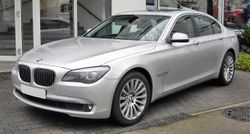 |
|
| Production | 2009–present |
|---|---|
| Class | Full size luxury car |
| Body style(s) | 4-door sedan |
| Layout | FR Layout, AWD (750i/Li only) |
| Engine(s) | 6.0L 552 PS (406 kW) twin turbo V12 4.4L 407 PS (299 kW) twin turbo V8 3.0L 326 PS (240 kW) I6 3.0L 245 PS (180 kW) turbodiesel I6 3.0L 306 PS (225 kW) turbodiesel I6 |
| Transmission(s) | 6-speed ZF automatic 8-speed ZF automatic |
| Wheelbase | 3,070 mm (120.9 in) (SWB) 3,210 mm (126.4 in) (LWB) |
| Length | 5,072 mm (199.7 in) (SWB) 5,212 mm (205.2 in) (LWB) |
| Width | 1,902 mm (74.9 in) |
| Height | 1,479 mm (58.2 in) (SWB) 1,478 mm (58.2 in) (LWB) |
The 5th generation F01/F02 came out January 2009. The F01/F02 heralded the introduction of the ZF 8-speed automatic transmission. Five variants are showcased at debut, the 750Li, the 740Li, the 750i, the 740i and the 730d.
Numerous engines also power the 7 Series worldwide. BMW offers diesel, straight 6, V8 and V12 motors. An all-aluminum 3.0-liter straight-six cylinder diesel engine produces 245 hp (183 kW; 248 PS). The peak torque figure of 540 N·m (400 lb·ft) comes in at 1,750 rpm up through 3,000 rpm. Its 194g/km emission figure is class-leading for conventionally powered luxury cars, as is its 38.7 mpg fuel consumption figure.[11]
BMW switched from a MacPherson strut front suspension to a double wishbone design for improved handling. The F01 is also available in a bulletproof version.[12]
| Model | Engine Code | Engine Type | Displacement | Power | Torque | 0–100 km/h (s) | Years made |
|---|---|---|---|---|---|---|---|
| 760Li | N74B60 | V12 48V | 5,972 cc (364.4 cu in) | 544 PS (400 kW; 537 hp) @ 5250 rpm | 750 N·m (550 lb·ft) @ 1500-5000 rpm | 4.6 (aut) | 2009- |
| 750i/750Li | N63 | V8 32V | 4,395 cc (268.2 cu in) | 408 PS (300 kW; 402 hp) @ 5500-6400 rpm | 600 N·m (440 lb·ft) @ 1750-4500 rpm | 5.5 (aut) | 2009– |
| 740i/740Li | N54 | I6 24V | 2,979 cc (181.8 cu in) | 326 PS (240 kW; 322 hp) @ 5800 rpm | 450 N·m (330 lb·ft) @ 1500-4500 rpm | 5.7 (aut) | 2009– |
| 730d/730Ld | N57 | I6 24V | 2,993 cc (182.6 cu in) | 245 PS (180 kW; 242 hp) @ 4000 rpm | 540 N·m (400 lb·ft) @ 1750-3000 rpm | 7.2 (aut) | 2009– |
| 740d[13] | N57 | I6 24V | 2,993 cc (182.6 cu in) | 306 PS (225 kW; 302 hp) | 600 N·m (440 lb·ft) @ 1500-2500 rpm | 6.3 (aut) | 2009– |
In April 2009, BMW announced plans for a 760Li, which will be BMW's new flagship model. The 760Li will be equipped with a twin-turbocharged V12 producing 544 horsepower, which will propel the car from 0 to 62 miles per hour in 4.6 seconds.[15][16]
In 2010, all-wheel-drive (BMW xDrive) became available on the 7-series.
Improved iDrive
The new F01/F02 is equipped with a more intuitive iDrive system with a full featured web browser. This will be safer, and more technologically advanced as well as rich in entertainment.
ActiveHybrid 7
The BMW Concept 7 Series ActiveHybrid was unveiled at the Paris Motor Show in October 2008.[17] In August 2009 BMW announced the production versions of the ActiveHybrid 7, together with BMW ActiveHybrid X6.
The 2011 ActiveHybrid 7 is a mild hybrid and features a 0.4 kWh lithium-ion battery pack.[18] The electric motor is combined with BMW’s 4.4-liter twin-turbo V8 and new 8-speed automatic transmission to accelerate from 0 – 60 mph in just 4.7 seconds.[19] Estimated EPA fuel economy is 17 miles per US gallon (14 L/100 km; 20 mpg-imp) city and 26 miles per US gallon (9 L/100 km; 31 mpg-imp) for highway, which represents almost an 18% improvement over the non-hybrid 750i/Li.[19]
U.S. sales began in June 2010 with a base MSRP price of $103,125 for the ActiveHybrid 7 and $107,025 for the long wheelbase ActiveHybrid 7L. The ActiveHybrid 7 qualifies for a $900 U.S. Federal Tax Credit.[19]
References
- ↑ monocom gmbh Dingolfing. "BMW Werk Dingolfing". Bmw-werk-dingolfing.de. http://www.bmw-werk-dingolfing.de. Retrieved 2009-10-14.
- ↑ "BMW car factory in Mexico. | Russell Gordon Photography SERBIA". Russellgordon.photoshelter.com. 2002-02-20. http://russellgordon.photoshelter.com/image/I0000369oFQ87U5E. Retrieved 2010-08-21.
- ↑ Oswald, Werner (1. Auflage 2001). Deutsche Autos 1945–1990, Band 4. Stuttgart: Motorbuch Verlag. ISBN 3-613-02131-5., p. 244
- ↑ "James Bond multimedia | BMW 750iL". Jamesbondmm.co.uk. http://www.jamesbondmm.co.uk/vehicles/bmw-750il. Retrieved 2010-02-12.
- ↑ "BMW AG : Products : 7 Series Sedan". Bmw.com. http://www.bmw.com/generic/com/en/products/automobiles/showroom/7series/sedan/index.html. Retrieved 2009-06-06.
- ↑ Interone Worldwide GmbH (2008-06-17). "BMW 7 Series Sedan : Six-cylinder diesel engine (730d, 730Ld)". Bmw.com. http://www.bmw.com/com/en/newvehicles/7series/sedan/2005/allfacts/engine_6c_diesel.html. Retrieved 2009-06-06.
- ↑ 7.0 7.1 Interone Worldwide GmbH (2008-06-17). "BMW 7 Series Sedan : Eight-cylinder petrol engines (750i/Li, 740i/Li)". Bmw.com. http://www.bmw.com/com/en/newvehicles/7series/sedan/2005/allfacts/engine_v8_petrol.html. Retrieved 2009-06-06.
- ↑ Interone Worldwide GmbH (2008-06-17). "BMW automobiles - website of the BMW AG". Bmw.com. http://www.bmw.com/com/en/index_narrowband.html?content=/com/en/newvehicles/7series/sedan/2005/introduction.html. Retrieved 2009-06-06.
- ↑ Valdes-Dapena, Peter (2006-09-12). "Coming soon: Hydrogen-powered BMW". CNN. http://money.cnn.com/2006/09/12/autos/bmw_hydrogen/index.htm?postversion=2006091212. Retrieved 2010-04-26.
- ↑ "BMW 7 Series Security Car". DieselStation.com. http://www.dieselstation.com/cars/2010-bmw-7-series-high-security-a1983.html.
- ↑ "The New BMW 730Ld". Automoblog.net. http://www.automoblog.net/2009/01/28/the-new-bmw-730ld/.
- ↑ "BMW 7 Series High Security – a new definition of security". Carthusiast.com. http://www.carthusiast.com/bmw-7-series-high-security-a-new-definition-of-security-1992.html. Retrieved 2009-09-11.
- ↑ Paul Tan (June 25, 2009). "F01/F02 BMW 7-Series gets updated with new 740d, xDrive and M-Sport kit!". Paul Tan's Automotive News. http://paultan.org/archives/2009/06/25/f01f02-bmw-7-series-gets-updated-new-740d-xdrive-and-m-sport-kit/. Retrieved June 25, 2009.
- ↑ Paul Tan (July 5, 2008). "New BMW 7-Series F01 Specifications and Photos". Paul Tan's Automotive News. http://paultan.org/archives/2008/07/05/new-bmw-7-series-f01-specifications-and-photos/. Retrieved July 5, 2008.
- ↑ "BMW’s New Flagship - the 760Li". Automoblog.net. http://www.automoblog.net/2009/04/27/bmws-new-flagship-the-760li/.
- ↑ "BMW 760Li Press Release and Specifications" (PDF). http://www.bmwblog.com/docs/BMW_760i_760Li.pdf.
- ↑ "2008 Paris Auto Show: BMW Concept 7 Series ActiveHybrid". Edmunds.com Inside line. 2008-10-02. http://blogs.insideline.com/straightline/2008/10/2008-paris-auto-show-bmw-concept-7-series-activehybrid.html. Retrieved 2010-06-04.
- ↑ "BMW Announces Production Versions of ActiveHybrid X6 and ActiveHybrid 7; Part 2: The ActiveHybrid 7 with Li-ion Pack". Green Car Congress. 2009-08-13. http://www.greencarcongress.com/2009/08/activehybrid-7-20090813.html. Retrieved 2010-06-04.
- ↑ 19.0 19.1 19.2 "BMW ActiveHybrid 7 Qualifies For $900 US Federal Tax Credit". Green Car Congress. 2010-06-04. http://www.greencarcongress.com/2010/06/bmw-20100604.html#more. Retrieved 2010-06-04.
External links
- BMW Active Seat Technology Guide
- Night vision technology in the BMW 7-Series
- 733i TV Review
- Alpina B7 (Alpina version of 7 Series)
- BMW 7 Series High Security
- All-new BMW 7-Series for 2009
- BMW 740d added to 7-Series - Includes images
| Type | Series | 1980s | 1990s | 2000s | 2010s | ||||||||||||||||||||||||||||||||
| 0 | 1 | 2 | 3 | 4 | 5 | 6 | 7 | 8 | 9 | 0 | 1 | 2 | 3 | 4 | 5 | 6 | 7 | 8 | 9 | 0 | 1 | 2 | 3 | 4 | 5 | 6 | 7 | 8 | 9 | 0 | 1 | 2 | 3 | 4 | 5 | ||
| Small family | 3 Compact | E36/5 | E46/5 | ||||||||||||||||||||||||||||||||||
| 1 Series | E81 / E82 / E87 / E88 | F20 | |||||||||||||||||||||||||||||||||||
| Compact exec | 3 Series | E21 | E30 | E36 | E46 | E90 / E91 / E92 / E93 | |||||||||||||||||||||||||||||||
| Executive | 5 Series | E12 | E28 | E34 | E39 | E60 / E61 | F10 / F11 | ||||||||||||||||||||||||||||||
| Luxury Coupé | 6 Series | E24 | E63 / E64 | F12 / F13 | |||||||||||||||||||||||||||||||||
| Luxury | 7 Series | E23 | E32 | E38 | E65 / E66 / E67 / E68 | F01 / F02 / F03 / F04 | |||||||||||||||||||||||||||||||
| Roadster | Z Series | E30 (Z1) | E36/7 & E36/8 (Z3) | E85 / E86 (Z4) | E89 (Z4) | ||||||||||||||||||||||||||||||||
| M | M3 | E30 M3 | E36 M3 | E46 M3 | E90/92/93 M3 | ||||||||||||||||||||||||||||||||
| M5 | E28 M5 | E34 M5 | E39 M5 | E60/61 M5 | |||||||||||||||||||||||||||||||||
| M6 | E24 M635CSi/"M6" | E63/64 M6 | |||||||||||||||||||||||||||||||||||
| M Roadster | E36/7 (Z3) M | E85 (Z4) M | |||||||||||||||||||||||||||||||||||
| M Coupé | E36/8 M Coupé | E86 M Coupé | |||||||||||||||||||||||||||||||||||
| Supercar/GT | E26 (M1) | E31 (8 series) | E52 (Z8) | ||||||||||||||||||||||||||||||||||
| Sports Activity | X1 | E84 | |||||||||||||||||||||||||||||||||||
| X3 | E83 | F25 | |||||||||||||||||||||||||||||||||||
| X5 | E53 | E70 | |||||||||||||||||||||||||||||||||||
| X6 | E71 / E72 | ||||||||||||||||||||||||||||||||||||
| Progressive Activity | 5 GT | F07 | |||||||||||||||||||||||||||||||||||